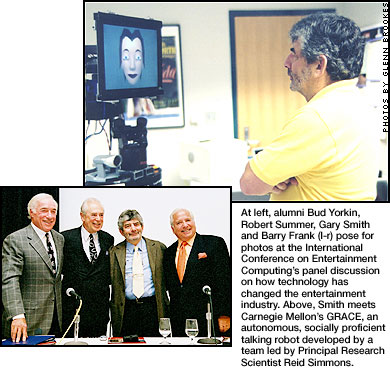|
|
||
|
|
|
 "Entertaining" Alumni Discuss Technology in Tinsel Town � Technology has changed the way entertainment is created, acquired and either paid for or pirated, four Carnegie Mellon alumni told an international audience gathered in Pittsburgh in May. But, before audience members could get too excited about the impact new technologies will have on entertainment, panelists cautioned them that the essence of what constitutes good art hasn't changed. Sports agent Barry Frank (A'54), Emmy Award-winning television producer Gary Smith (A'56), media company executive Robert Summer (PM'55) and "All in the Family" co-creator Bud Yorkin (E'48) spoke on transformations in Hollywood at the Carnegie Museum of Art, May 9. The panel was part of the second annual International Conference on Entertainment Computing (ICEC), which drew about 200 participants. It was co-hosted by Carnegie Mellon's Entertainment Technology Center and the Art Institute of Pittsburgh. When Frank, Smith and Summer were roommates at Tech, Yorkin was already participating in what he called the "Golden Age" of television. He produced and directed variety shows featuring Dean Martin and Jerry Lewis, Bud Abbott and Lou Costello, and George Gobel. After earning a bachelor's degree in electrical engineering, Yorkin said he decided to "take a path where I could meet beautiful women." His show biz career began in 1949, when he became a television engineer at NBC. Producing live television presented particular challenges. At the end of the first Martin and Lewis Show, Yorkin's assistant noticed the comic duo had left the stage two minutes too early. Told to go back and ad lib, Lewis grabbed a fire hose and ran onstage. Meanwhile, Martin turned on the hose. The stream of water blew out a camera and sent the musicians scrambling to protect their instruments, Yorkin recalled. The New York Times television critic called the stunt the highlight of the show. Yorkin is now working on a possible sequel to his 1982 film "Blade Runner," a cyberpunk vision of urban life. Because of technological advances, creating the future would be quite a different process from what it was two decades ago. But, he said, "no computer can write a script." Summer, who is board chairman of the media and technology company World Theatre and a past president of Sony Music International and RCA Records, described one of the downsides of technological advances—at least from the creators' perspective. The music industry has a long history of combating copyright infringement represented by counterfeit records, bootlegged concert albums and audiocassette copies of albums. "Then comes what we'll call the mother of all systems of music theft," he said. That is Internet file copying or, as some prefer, file sharing. Although a court decision sidelined the well-known file-sharing site, Napster, other sites that offer similar music-copying opportunities have arisen. The music industry continues to battle these sites in court to protect its profits. As some members of the audience slumped down in their seats, Summer said one proposed countermeasure involves destroying all of a person's computer files if he infringes on copyright. Summer doesn't see a need to do anything so ominous and appealed to all those who love music to unite "to prevent the destruction of what we enjoy." The television industry faces payment issues that parallel those of the music industry. Although viewers don't have to pay to watch network television, part of the bargain traditionally has been that they sit through the commercials that fund the programs. Videocassette and digital video recorders now allow consumers to skip commercials, and the television industry needs to make up for falling advertising revenue. Eighty-eight million homes in the United States now subscribe to some form of paid television, said Frank, a sports agent for the International Management Group who has negotiated television rights for the Olympic Games. He predicted that the basis of payment for watching TV would eventually be modeled on per-minute long-distance telephone charges. "The viewer is going to end up supporting the television industry within the next 10 years," said Frank, who currently represents Muhammad Ali and football color commentator John Madden. The cost won't be high, perhaps a penny for each minute of television watched, but it will make consumers more judicious about what they view. When they watch, they'll see actors performing in settings that the actors may have never seen themselves, because they were created digitally after the scenes were shot. Digitalization of the film industry means "there's no such thing as a location barrier," said Smith, who with collaborator Dwight Hemion has produced numerous television specials, four Democratic National Conventions and six Tony Award telecasts, and won 24 Emmy Awards. Smith loves all the tools the scientifically creative have invented to improve television production. But, he reminded conference goers, "the best we have to offer comes from here first"—he pointed to his heart—"not from here." He tapped his head. � � � � � � �
�
Top�
�
�
Ruth Hammond
�
|
|
This Issue's Headlines || Carnegie Mellon News Home || Carnegie Mellon Home |
||